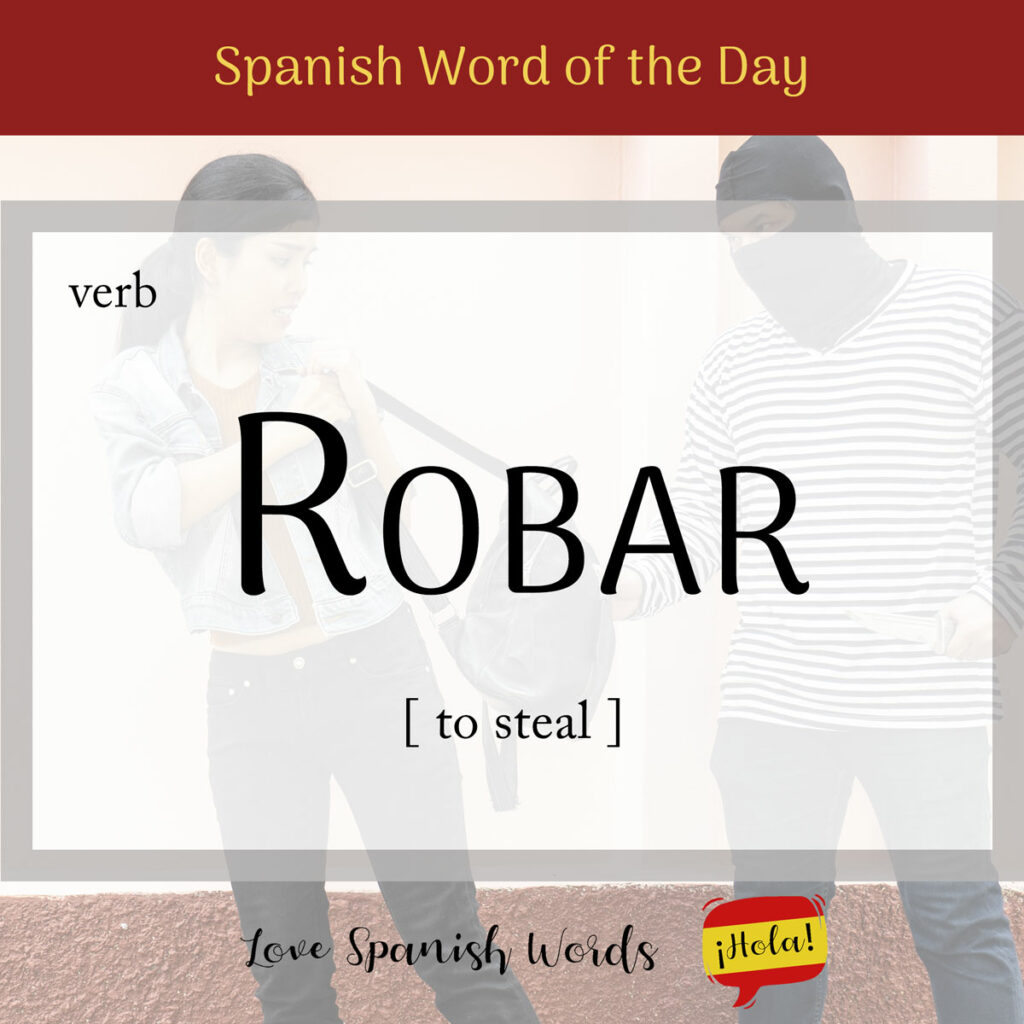The word robar comes from the Latin verb robare, meaning to seize or take by force. The word describes the act of taking something that does not belong to you, or in other words, stealing.
Latin American Pronunciation
European Pronunciation

Robar is regular verb that follows the standard conjugation patterns for -ar verbs that you see below, starting with present, past, and future tense.
- yo robo
- tú robas
- él/ella/usted roba
- nosotros/as robamos
- vosotros/as robáis
- ellos/ellas/ustedes roban
- yo robé
- tú robaste
- él/ella/usted robó
- nosotros/as robamos
- vosotros/as robasteis
- ellos/ellas/ustedes robaron
- yo robaré
- tú robarás
- él/ella/usted robará
- nosotros/as robaremos
- vosotros/as robaréis
- ellos/ellas/ustedes robarán
¡Nunca deberías robar!
You should never steal!
The literal meaning for robar is to steal or to rob. It involves the action of taking someone else’s property without their acknowledgment. Robar includes a range of actions such as theft like shoplifting or more serious crimes like armed robbery.
One way to robar is through robo (theft). A person can robar various places such as stores, homes, or public places. For example, Alguien robó mi carro would be Someone stole my car.
What we know of in English as a robbery is also called a robo in Spanish. In Spanish, to specify it was forced, you say un robo forzado.
The English term burglary in Spanish is also robo. This term is used in English when someone sneaks into a home or a store to steal. For example, Robaron la casa mientras estaba en el trabajo (They robbed the house while I was at work.)
Below is a past tense conjugation using -ellos/ellas of a robo forzado (burglary):
Los ladrones robaron el banco a plena luz del día.
The robbers robbed the bank in broad daylight.
Figuratively and metaphorically, robar refers to taking away something intangible, such as emotions, feelings, attention, affection, or experiences. The use of the word robar in this form conveys a more poetic or emotional nuance.
Metaphorically speaking about feelings, someone or something can robar (steal) your joy, happiness, or peace due to circumstances or actions. For example, La muerte de mi perro me robó la alegría de vivir (The death of my dog robbed me of the joy of living.)
Someone can also steal your emotions, such as when someone captures your admiration or affection. Example, Mi bebé me robó el corazón desde que nació (My baby has stolen my heart since he was born.)
Another common use is when someone or something steals your attention from something else. Example, El mensaje de texto que recibí me robó la atención y ya no pude escuchar a la maestra. (The text message I received stole my attention and I could no longer hear the teacher.)
Furthermore, a popular way to use robar figuratively is when someone’s time is wasted or an opportunity is taken away or stolen. For example:
No me gusta robarle el tiempo a nadie con mis problemas.
I don’t like taking up anyone’s time with my problems.
Here is a list of the most popular metaphors using the verb robar:
- robar la paz = steal the peace
- robar la alegría = steal joy or happiness
- robar la atención = steal attention
- robar una oportunidad = steal an opportunity
- robar el corazón = steal a heart
- robar el tiempo = steal time
There are other Spanish words related to robar with slightly different meanings but still involve someone taking something away; for example, in some countries the verb atracar is commonly used when specifically referring to a violent or aggressive theft. As we already mentioned, the act of theft or robbery is called a robo, which is a noun.
The person who does the stealing is called a ladrón (male thief) or a ladrona (female thief). A ladrón or ladrona can commit a regular robo or a robo armado (robbery), which is usually also referred to as a robo a mano armada (robbery at gunpoint). Another word for theft in Spanish is hurto, but mostly it’s used for petty theft.
A ladrón or ladrona can despojar their victima (victim). Despojar means to disposses. It’s used when someone is stripped from their belongings. Similarly, the verb substraer means to subtract or remove, and it refers to legal contexts for theft, such as removing money from a cash register.
Despojaron a la víctima de sus pertenencias durante el asalto.
They stripped the victim of their belongings during the assault.
Lastly, estafa is a word used for scam or fraud. It involves a ladrón or ladrona who doesn’t directly steal but rather takes advantage of a víctima (victim) through deceptive means. For example, when a buyer purchases a cellphone and transfers money, but the seller never sends the phone and disappears.

Spanish idioms featuring ‘robar’
Robar un beso
Literal translation: to steal a kiss
English meaning: to kiss someone in a quick and unexpected way
Robar el show
Literal translation: to steal the show
English meaning: to get a lot of attention or praise because the person performs better than anyone else in a show or other event
Robar protagonismo
Literal translation: to steal the spotlight
English meaning: to take away attention from someone or something without their permission or intention of returning it
Robar a mano armada
Literal translation: to steal at armed hand
English meaning: to rob at gunpoint

